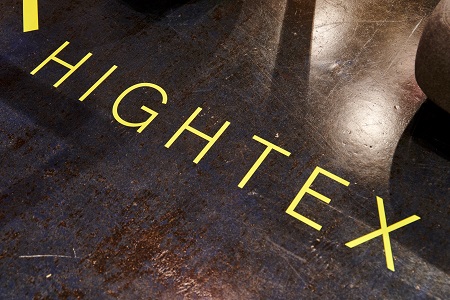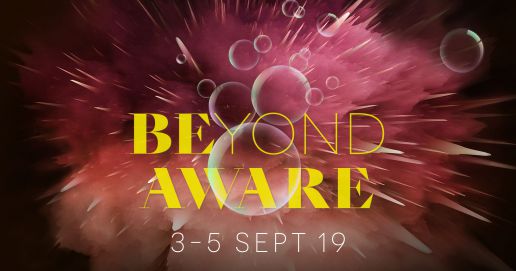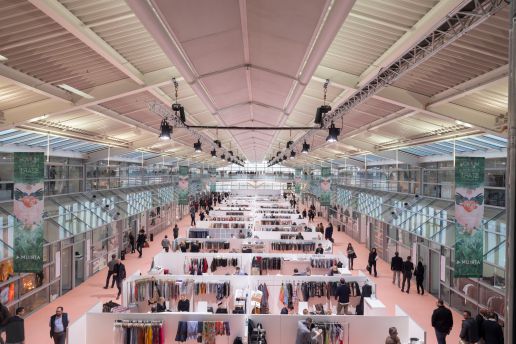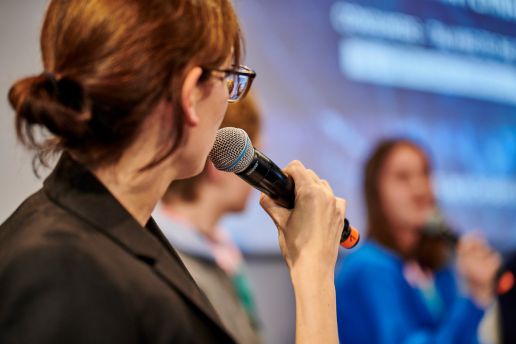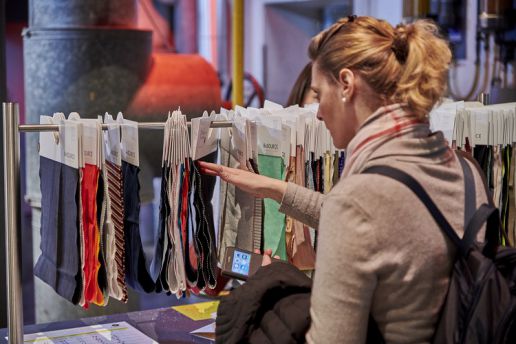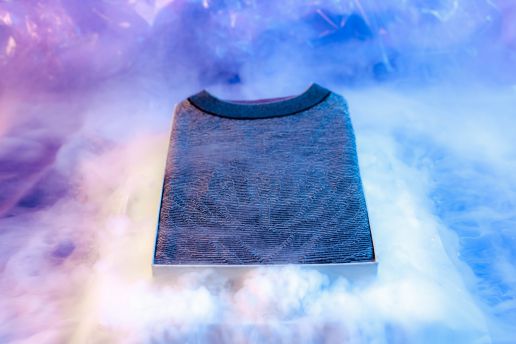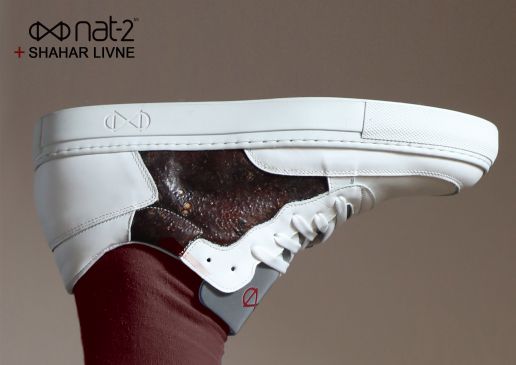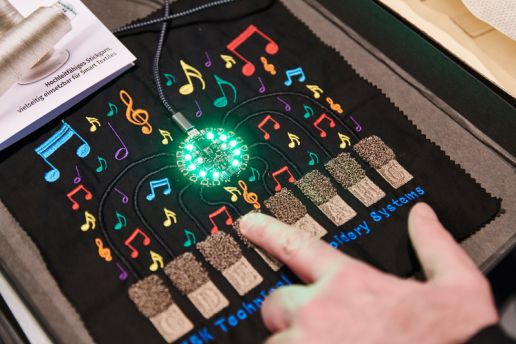Keyhouse
Strong Themes, Progressive Formats & New Areas
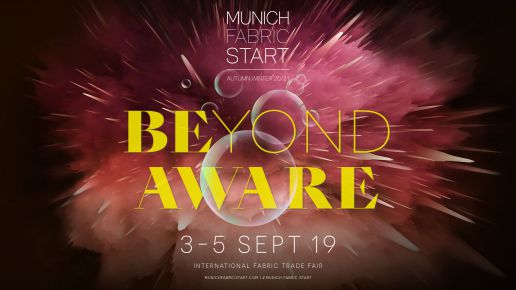
MUNICH FABRIC START with BLUEZONE, KEYHOUSE and the individual presentations of over 1,000 international suppliers of fabrics and additionals once again sets new standards in concept forecasting. The current format has been expanded, complemented and deepened in terms of both quality and quantity. On September 3-5 2019, a broad spectrum of fabrics, additionals, prints or denim, manufacturing services and a supporting programme will be on offer to the 20,000 trade visitors expected in Munich, offering unprecedented dimensions of information and inspiration.
‘Over the last few years we have successively expanded the exhibition space. We have supplemented BLUEZONE with the CATALYZER, the KEYHOUSE is successfully established as a think tank and now, we will relaunch the ever essential area of SOURCING. With this evolved structure we are focused on the strategic approach of showcasing new fields of inspiration in a unique, exclusive and appropriate setting. We look forward to presenting three trade fair days with an unparalleled range of products and topics, offering the industry many new products, innovative process solutions and cutting-edge material resources.’
Sebastian Klinder, Managing Director MUNICH FABRIC START
HIGHLIGHTS at MUNICH FABRIC START
- – Trend Presentations take on a brand new form in the MOC.
- – The ReSOURCE Area in front of Hall 4, Area K4, has once again been extended and establishes itself as the centre for sustainable fabrics and additionals with proven expertise and know-how.
- – A special opening will be the SOURCING Area in the newly opened Hall 8, directly opposite the MOC.
- – The KEYHOUSE, as a think tank of MUNICH FABRIC START, spans the fashion spectrum from technology to sustainability, from digitalisation to new material resources and manufacturing processes, offering a wealth of cutting-edge research projects, inspiring collaborations and high-tech product and process developments.
- – Future-oriented: the new SUSTAINABLE INNOVATIONS Forum at KEYHOUSE, curated by Simon Angel.
- – The ALL RELATED COLLAB PROJECT by BLUEZONE is an innovative concept for future collaborations and network cooperation.
- – The HighTex Award will be presented for the 7th time. The MUNICH FABRIC START Innovation Prize honours outstanding initiatives and commitment in the fields of intelligent process solutions, innovative highlights, biotech, digitalisation and sustainable innovations.
- – The start of the side event program will mark the start of the fair on Tuesday 3rd of September, SusTECHability – HOW TRENDS & TECHNOLOGY INFLUENCE SUSTAINABILITY IN FASHION with an expert panel.
- – In the afternoon on the 3rd of September Li Edelkoort will introduce the latest shapes, textiles and colours for Autumn Winter 20/21 in an exclusive trend presentation. Providing the first glimpse of the colours for Spring Summer 21 and point to the comeback of Casual Wear with Recreation.
BEYOND AWARE – Global trend
BEYOND AWARE, the overarching trend theme for Autumn 20/21 analyses the multi-layered levels of awareness on different planes of perception – personal, global, regional, mental, rational, emotional and transcendental. It’s all about self-awareness and contemplating the status quo. BEYOND AWARE stands for a new way of thinking and rethinking that goes far beyond our previous understanding of fashion.
It’s about more than just fashion!
BEYOND AWARE calls for the observation and very responsive reaction to the changes in consumer and clothing habits – one that is dynamic, attentive and bold. Combined with the demand for change in trends as well as values, which is currently manifested in two ideological concepts. On one hand is Bold Expressions presents an individual, very enthusiastic lifestyle and fashion style. On the other hand is Forward Ethics for conscious, responsible consumption. Two very different concepts that polarise and attract attention. The affirmation of BEYOND AWARE.
SECTIONS
Fabrics
Winter fabrics will feature woolly, new-twist classics, comfort and aesthetics coupled with modern casualness. Most manufacturers are now focusing their collections on sustainably produced goods and processes. Sustainability has become a natural part of the upstream stage. New consumer awareness and transparency have led to fundamental shifts. Both in fabrics as well as colours trends, not least in the styles expected. More than 800 international fabric suppliers hosted in the FABRICS areas at MUNICH FABRIC START will demonstrate the versatile and individual ways this trend can be understood and translated. Sometimes progressive, classic or sporty, sometimes masculine or with new femininity. Often with a voluminous, soft finish. But always with the greatest possible lightness.
Additionals
Perfectly coordinated buttons, striking zippers, decorative rhinestone appliqués, individually designed labelling. The latest creations for buttons, ribbons, decorative stones, fasteners, lace, embroidery and labels will be presented by over 200 leading international suppliers of additionals and accessories for Autumn Winter 20/21 in the ADDITIONALS Area of MUNICH FABRIC START.
Design Studios
Inspiring print designs and creative energy are provided by the most important international textile designers and trend agencies hosted in the DESIGN STUDIOS at MUNICH FABRIC START on the firstFLOOR. Setting impulses for future prints, always in search of the special and truly unique.
SOURCING Area
The launch of the SOURCING Area in the new Hall 8 of the recently opened Business Club Munich opposite the MOC provides direct connection to MUNICH FABRIC START and BLUEZONE. Over 80 international apparel manufacturers and producers will be showcasing their services for womenswear, menswear, accessories, corporate, couture and tailored segments among others, at this independent and suitable space thus meeting the growing demand for manufacturing services.
‘The idea of this new segment is based on creating an inspiring and efficient atmosphere in a contemporary and high-quality setting. And thus also a unique environment for network communication and work. With the new SOURCING area we can now map the textile supply chain at one location in Munich.’
Frank Junker, Creative Director MUNICH FABRIC START
The exhibiting companies include established manufacturers from Portugal, Tunisia, Morocco, Italy, Macedonia, Greece, Turkey, Bosnia and Herzegovina and Hong Kong among others.
ReSOURCE
Awareness of ecologically sustainable certificates and seals of quality is on the rise. With ReSOURCE, MUNICH FABRIC START has established a broad sourcing platform that provides sustainable solutions for innovative and future-oriented production processes. Supported and established by experts, the forum offers concrete solutions informing visitors about relevant developments and the latest standards through a series of seminars and lectures, in a bid to bring together potential cooperation partners. In Area K3/4 of Hall 4, ReSOURCE will be showcasing over 600 innovative articles certified and/or produced in an environmentally friendly way.
In the emerging circular economy of the future, nothing is treated as waste. What is left over from one process becomes input to another, so keeping it circualting. Refibra technology gives a second life to pre-consumer cotton waste from garment manufacturing – which would otherwise be sent to landfills or incinerated – by upcycling it into brand new cellulosic fiber materials for clothing and home products. In a special installation, Lenzing will showcase closed-loop recycling with its complete production process for TENCEL™ x REFIBRA™ at the ReSOURCE area.
Through personal discussions on site, visitors can learn key details about the respective certificates and seals directly from the responsible certification organisations and institutes. The entire portfolio of innovations shown in the ReSOURCE Area is available all year round on the new website:
KEYHOUSE - From Poetry to Digitalisation
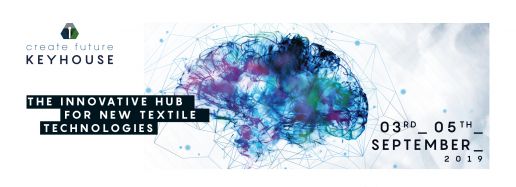
As a think tank for fashion tech, smart textiles, sustainability and innovation, KEYHOUSE offers concrete approaches for a future-oriented textile and fashion industry. It spans the spectrum from technology to sustainability, from digitalisation to new material resources and manufacturing processes. The mindset of ‘democratic’ research projects, inspiring collaborations and networks as well as high-tech product and process development reflects the pulsating mood of KEYHOUSE at MUNICH FABRIC START.
Those attending include:
Smart Textiles Pop-Up Lab by Holst Centre x Pauline van Dongen featuring interactive workshops on printing electronics on textiles. As a Dutch research hub, the Holst Centre specialises in the development of printed electronics. Unlike conventional electronics, these circuits are thin, lightweight, flexible and even stretchable. They make it possible to make all kinds of products and materials interactive. The material properties of these printed electronics make them particularly suitable for integration in textiles.
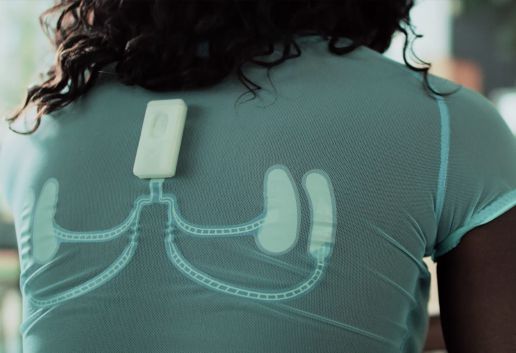
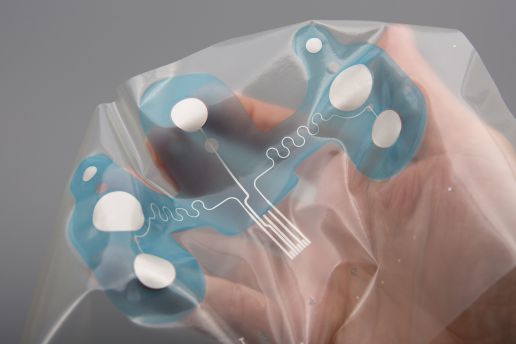
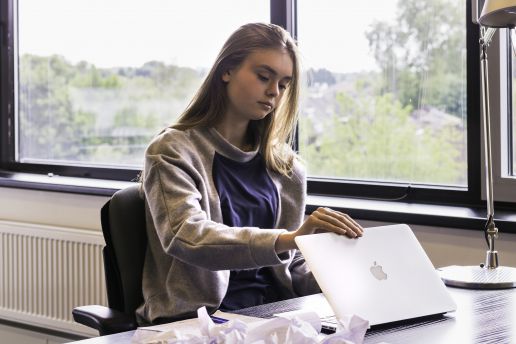
KNITCLOUD by N.I.O. combines sustainability and digitalisation with the launch of a personalised 3D knitwear-on-demand brand at the Keyhouse, which as a smart network offers a future-oriented, sustainable answer to today’s overconsumption of clothing. What began with initial tests by start-up company The Girl and The Machine has now developed into a market-ready brand for custom-made 3D knitwear on demand that will be scalable in the future. Knitcloud by N.I.O. (New Industrial Order) will allow brands, designers and web shops to connect virtual designs, body measurement apps, virtual fitting solutions and a digital tailor system (DTS) with a subsequent on-demand ordering system (ONOS). In future, this smart concept will make it possible to produce customised and personalised clothing – as the world’s first open ecosystem for 3D knitwear on demand.
KPMG, one of the leading auditing and consulting firms in Germany, will deliver a unique fusion of business, technology and fashion to the KEYHOUSE this season together with the global IT group Microsoft. This partnership is dedicated to business and technology systems for the fashion industry. The launch of disruptive technologies such as HoloLens, a new POS system, better process management tools and integrated social media engagement will satisfy the modern, demanding customer of the future, ensuring a new era for fashion retailing.

DIGITAL FABRIC LAB
As a joint showcase initiated by MUNICH FABRIC START, the leading specialist firms Assyst, Caddon, Vizoo, Triple Tree Solutions and the University of Dresden have joined forces to present a new type of digitalisation process for fabrics in a comprehensible and practical way through simulated digitalisation stations. The DIGITAL FABRIC LAB demonstrates a new form of analysis process that overhauls production and accelerates it many times over. Digital material parameters such as elasticity, flexibility, tension and rigidity are determined for the realistic use of textiles in product simulation. For these physical measurements, surfaces, colours and textures must be recorded and collated in a technologically presentable way.
‘Digitalisation 4.0 is certainly one of the key issues when it comes to future process controls. One of the essential building blocks within these major technical changes will be the digitalisation of fabrics and additionals. For each fabric and each button there will be a digital ‘twin’.’
Sebastian Klinder, Managing Director MUNICH FABRIC START
SUSTAINABLE INNOVATIONS
Creating alternative materials from unusual resources, instructions for a new approach to textiles and clothing and the rediscovery of traditional crafts – the SUSTAINABLE INNOVATIONS Forum will showcase it all, discover:
-
-
- PHERES & AUXTEX by Eric Esser, with the creation of CAD files thanks to the 3D printing process FDM (Fused Deposition Modelling).
- Atlas of Sustainable Colour(s) by JULIA KALETA as a sustainable colour compass.
- LOOP.A.LIFE with a circular approach to extending the life cycle of textiles.
- LOOP COLLABORATION STUDIO as an integrative movement of socially oriented resource exploitation.
- WORN TO WEAR by Lena Winterink interprets the conscious handling of clothing through the use of copper wire in the yarn.
- SWART LAEKEN by Lotte Gulpers present high-quality items made of premium wool as a sustainable raw material.
- DYELUX by Nikolett Madai uses by-products from the food industry to produce dyestuffs for textiles.
- KNOT by Sanne Visser looks at horn as a raw material from a new angle and creates yarns, ropes and nets from hair.
-
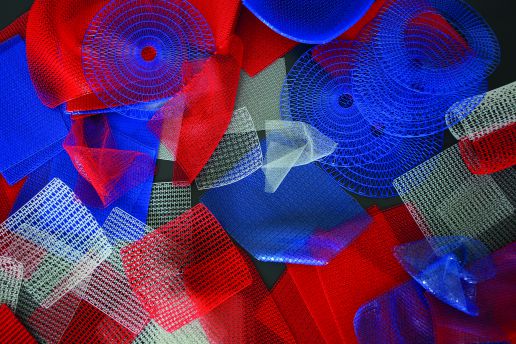
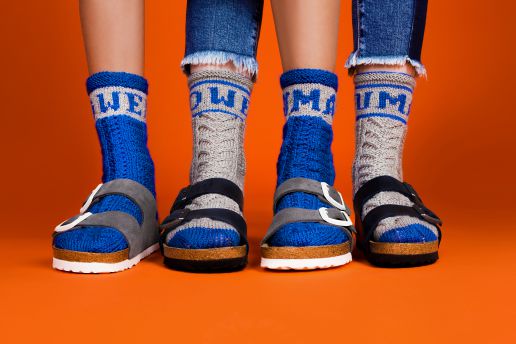
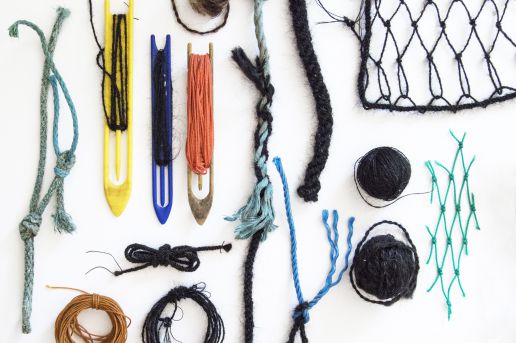
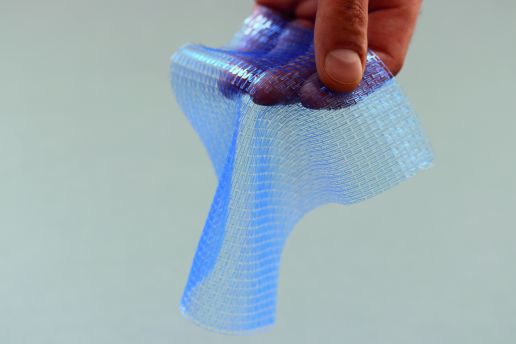
With these selected showcases at KEYHOUSE we give impulses and solutions for a future-oriented use of materials and marketable production processes. This offers great potential for synergies and collaborations, which – used at the right interface and linked together – will have a lasting impact on industry. This season we have once again succeeded in mapping out a broad range of relevant topics for the future.’
Claudia Mynott, Communications Director MUNICH FABRIC START
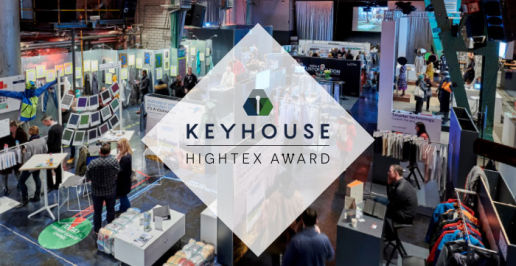
HIGHTEX AWARD
The HighTex Award will be presented for the 7th time. The MUNICH FABRIC START Innovation Prize honours outstanding initiatives and commitment in the fields of intelligent process solutions, innovative highlights, biotechnology, digitalisation and sustainable innovations.
‘We present the HighTex Award in recognition of outstanding achievements and, at the same time, as a motivation for innovative research projects and thus as a sustainable contribution to a clean future and conscious use of resources.’
Frank Junker, Creative Director, MUNICH FABRIC START

Candidates are assessed according to the following categories: High-Tex, Technology, Smart Fibres, Sustainability, Resource Efficiency, Finishing, Functionality, Health and Circularity Process. An essential principle here is process realisation and marketability. The award winning products and other innovations in the KEYHOUSE HighTex Award Forum will be on display for the entire duration of the trade fair. Supplemented by detailed information on the respective exhibited products including contact information.
SIDE EVENTS
Furthermore, KEYHOUSE offers a comprehensive and exclusive programme of side events throughout the duration of the trade fair. In addition to trend seminars, these include top-class workshops, talks and round table discussions.
The entire lecture programme can be found at >> events.munichfabricstart.com
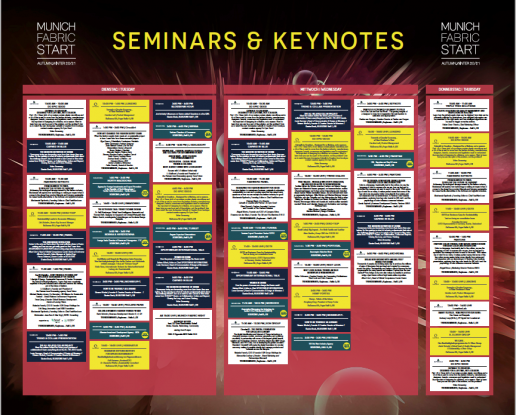
What to Expect From Munich Fabric Start
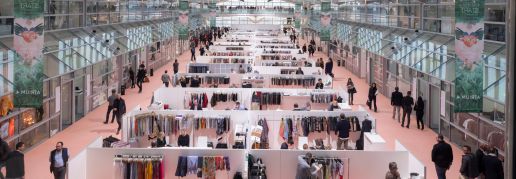
There is less than one week to go until we kick off the new season! We want to let you know what you can expect from MUNICH FABRIC START when you arrive in Munich on September 3-5.
International Brands
At MUNICH FABRIC START around 1.000 international exhibitors from 40 countries will present over 1.800 collections, including a comprehensive range of fabrics, trims and additionals, fabric finishing and manufacturing solutions, thus ensuring the proficiency and professionalism demanded by more than 20,350 trade visitors. We work with established specialists from all over the world who are ready to business on a global scale.
Networking
MFS provides an ideal opportunity for networking, the three day preview textile fair is guaranteed to be full of like-minded fashion and textile professionals. It is a great place to meet and exchange with new and existing partners who are also there to strengthen their business relationships and look for new opportunities.
Designs for the season
In addition to the new collections and previews on showcase for the new season AW2020/2021, we also offer you the possibility to view the highlights for SS2020. It has become more important than ever to curate sustainable fashion pieces using select fabrics which will transcend the seasons, with this new edition of our trend forum, we explore the power of slow fashion and sustainability which comes as standard, demanded by the new kind of conscious consumers.
An Event Tailored to You
Every aspect of the show is designed and organised with your requirements as designer, buyer or product manager in mind. We have created spaces that are perfect for working, relaxing, reflecting and recharging. We serve fresh coffee, snacks and tasty food all day long and we also invite you to a fun and relaxing Munique Moods event during the evening of September 3rd.
Trend Forecasting
We are a reliable source for future trends and leading indicators of trend styles and consumer behaviour. Our dedicated trend forum will showcase a hand-picked selection of fabrics, additionals and denim articles which define the new Autumn.Winter 20/21 season, a must see for those developing their new collections! The new COLOUR CODE and TREND BOOK publication release for Autumn.Winter 20/21 is planned for early August.
There is still plenty time to register for Munich Fabric Start this September 3-5 in Munich, we can’t wait to see you!
An Introduction to the Events Program at MUNICH FABRIC START

The event program on offer at Munich Fabric Start is a reflection on the issues, strategies and common themes the industry as a collective are facing right now. Through a series of seminars, panel discussions and keynote talks, we are equipping our visitors with the necessary tools and know-how to grow their brand and business successfully during these times.
Discover the events which are tailor-made for your business, check out our complete event program and begin to plan your trade fair visit. Here are our highlights from each of our event platforms at Keyhouse, ReSource and Denim Dock.

Create Future at Keyhouse
TUESDAY 3rd of September
SusTECHability Panel Discussion
11.30am – 1.00pm
SusTECHability – How trends and technology influence sustainability in fashion.
With Li Edelkoort of Trend Union, Michael Stnaley-Jones of United Nations Environment Programme, Tricia Carey of Lenzing Fibers, Natasha Franck of EON Group Holdings and Erik Bang of H&M Foundation. Moderated by Jana Kern and Alex Vogt of KERN Consulting.
EN
Swarovski Talk
2.00pm – 3.00pm
Trend Technik Design
With Dr Ralf Weinbeger and Christel Wickerath of Swarovski.
DE
Li Edelkoort Trend Presentation
4.00pm – 6.30pm
BROWN AGE – Fashion, Shapes, Textiles and Colours for AUTUMN/WINTER 20/21
GREEN WAVE – New Colours for SPRING/SUMMER 2021
RECREATION – Casual Wear Trends and Colours
MEET & GREET – Drinks with Li Edelkoort
EN
WEDNESDAY 4th of September
Fashnerd Panel
10.30am – 11.30am
Reshaping the Fashion Industry for good
With Muchaneta Kapfunde of FashNerd, Charney Magri of Fashion 4 Change and Do Epic Sh*t, Olivia Pinnock of The Fashion Debates and Abigail Morris of Compare Ethics.
EN
EON Group
11.30am – 12.30pm
Circular ID – The Digital Foundation for Circular Economy
With Natasha Franck at EON Group Holdings and Maruschka Loubser of Brand Marketing and Partnerships Microsoft
EN
Archroma
5.00pm – 6.00pm
Break new ground with aniline-free indigo for denim
With Albert Llort of Global Competence Center Denim
EN
THURSDAY 5th of September
FashNerd Keynote
11.00am – 12.00pm
From Seaweed to Fiber, Is Biology The Future of Fashion?
With Muchaneta Kapfunde of FashNerd
EN
Taking place in the lecture area in Keyhouse, Hall 5.

Let’s ReSource
TUESDAY 3rd of September
Lenzing
12.00pm – 1.00pm
Towards a circular economy – A fiber producer’s view
With Caroline Ledl of LENZING Group
DE
WEDNESDAY 4th of September
Oeko-Tex
1.00pm – 2.00pm
Sustainability leads to economic efficiency
With Dirk Schafer of Oeko-Tex
EN
THURSDAY 5th of September
s.Oliver Group
1.00pm – 2.00pm
WE CARE – The Sustainable Program by s.Oliver Group
With Astrid Schodel of s.Oliver Group
DE
Taking place in the lecture area in the MOC, ReSource k4 Area Foyer Hall 4.

Let Them Know at Denim Dock
TUESDAY 3rd of September
Panel Discussion
11.00am – 12.00pm
The Greendigo REvolution Panel Discussion
With Albert Llort of Archroma, Alberto Guzzetti of Tejidos Royo and Panos Sofianos, Denim Curator at Bluezone
EN
THE ALL RELATED TREND AND COLLABORATION PRESENTATION
12.00pm – 1.00pm
Meet the makers behind the future-proof premiere of collaboration and learn about the ALL RELATED trends
With Lucie Germset and Tilmann Wrobel of Monsieur T
EN
WEDNESDAY 4th of September
Sportswear International Talk
4.00pm – 5.00pm
WOMEN IN DENIM – How The Power of Woman Can Change The Denim World
With Sabine Kuhnl of Sportswear International, Lucie Germser of Monsieur T
EN
Monsieur-T
2.00pm – 3.00pm
How to be yourself as a brand
With Tilmann Wrobel of Monsieur-T
EN
Taking place in the elevated lecture area, Denim Dock, in the Bluezone Hall 7

Get up close and personal with BLUEZONE, one of the world’s largest denim shows featuring over 100 leading international denim & sportswear suppliers for Fabrics and Additionals.
You’re invited to attend MUNICH FABRIC START, where more than 1000 suppliers will present more than 1800 collections for Fabrics and Additionals for Autumn.Winter 20/21.
BLUEZONE: 3-4 of September 2019
MUNICH FABRIC START: 3-5 of September 2019
‘Sustainability is not just a trend but a MUST’

At Munich Fabric Start, we are constantly evolving and expanding our offering to meet the demands of the fashion industry. As a whole, the fashion industry is experiencing the effects from increasingly consumer led trends and habits. We are undergoing a shift from fast fashion to slower, sustainable and more responsible manufacturing, transparent supply chains as well as inherently greener brands, products and materials.
“Sustainability is more than just a trend. We are convinced that the industry will fundamentally change in the coming years from within and as a result of this topic.”
– Jo Baumgartner, Trend Researcher at Munich Fabric Start
The upcoming edition of Munich Fabric Start puts issues around sustainability at the forefront with revolutionary new formats. Here are our platforms and initiatives which are making it easier and more accessible to source sustainable at the next edition of Munich Fabric Start.
ReSource
With ReSource, Munich Fabric Start has established an advanced sourcing platform that demonstrates new dimensions of sustainability for innovative and future-oriented production processes. It has defined a forum, initiated and supported by experts that provides real solutions, provides information on the latest standards through seminars and lectures, even bringing together potential cooperation partners.
Find the complete ReSource range online to source your eco fabrics and trims 24/7. This unique platform facilitates the sourcing of responsible and clean fabrics and accessories from around the world.
Check out the full list of events happening at ReSource here.
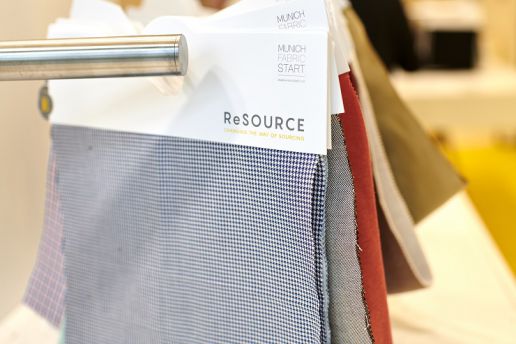
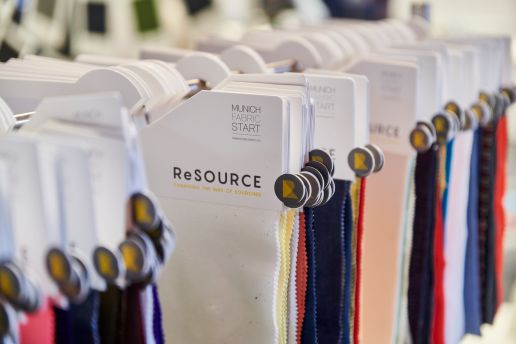
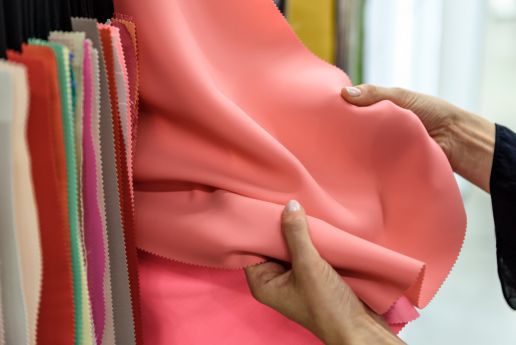
Trend Forum
In our Trend Forums we explore the theme of sustainability with “FORWARD ETHICS” the clothing brand concepts which represent the demand for transparency and caters to the more conscious and informed consumer. Fundamentally it explores the transparency in the production and supply chain, all the way from the seed used by farmers making natural dyes to production and distribution. Keynote speakers, panel discussions and round tables discussions will shed more light on this ongoing transformation as well as provide food for thought and insights into the future.
“Consumer behavior has changed a lot and with it, so too has the market. The consumer is more informed than ever before. The consumer is more conscious and critical, demanding transparency in the production and supply chain.”
– Jo Baumgartner, Trend Researcher at Munich Fabric Start
Events
The event program on offer at Munich Fabric Start is a reflection on the issues, strategies and common themes the industry as a collective are facing right now. With many of our seminars, panel discussions and keynote talks led by the theme of sustainability, we are equipping our visitors with the necessary tools and know-how to grow their brand and business successfully during these times. In particular you should be sure not to miss these two highlights:
SusTECHability – HOW TRENDS & TECHNOLOGY INFLUENCE SUSTAINABILITY IN FASHION
Lifestyle & Design. Sustainable Resources & Circular Processes. Big Data & Artificial Intelligence. Topics that were completely separate in the past influence each other and become the melting pot of the future of fashion.
Li Edelkoort | Founder and President of
the Parisian trend forecasting agency Trend Union
Michael Stanley-Jones | Co-Secretary, UN Alliance for Sustainable Fashion
– United Nations Environment Programme
Tricia Carey | Director Global Business Development Denim at Lenzing Fibers
Natasha Franck | CEO & Founder EON Group Holdings Inc.
Erik Bang | Innovation Lead H&M Foundation
Muchaneta Kapfunde | Founding Editor-in-Chief FashNerd.com
Moderation: Jana Kern & Alex Vogt | KERN. Consulting
Tuesday, 3rd September 2019 at 11.30am, KEYHOUSE Hall 5
HIDE ME

HIDE ME
RESHAPING THE FASHION INDUSTRY FOR GOOD
From slow fashion to mainstream business, materials to education, sustainability is a vast and complex issue that has raised many questions on how we can reshape the fashion industry for good.
Muchaneta Kapfunde, Founding Editor-in-Chief FashNerd.com, interviews these 4 ladies:
Charney Magri | Co-Director: Catwalk to Creation and Partner: Do Epic Good
Olivia Pinnock | Fashion Journalist, Lecturer and Founder of The Fashion Debates
Abigail Morris | Founder and CEO of Compare Ethics
Rosanne van der Meer | Founder The Girl and The Machine & N.I.O.
Wednesday, 4th September 2019 at 10.30am, KEYHOUSE Hall 5
Keyhouse
Our think tank for the fusion of fashion, innovation and technology with seminars, panels, presentations and guided tours, Keyhouse presents the latest innovations for smart textiles, sustainable developments and innovative production methods. The lecture area in Keyhouse will host a series of talks, presentations and discussions centered around the theme of sustainability.
Sustainable Innovations
Presented in Hall 5 at Keyhouse, Sustainable Innovations exists somewhere between poetry and problem solving. Showcasing inspirational applications of revolutionary innovations ranging from 3D printing, to human capital, to circular solutions.
‘With this edition we show several projects that provide concrete examples of what the successful interplay between poetry and problem solving can look like.’
– Simon Angel, Curator of Sustainable Innovations
Exhibitor Developments and Sample Areas
Samples submitted to our ReSource area will be showcased throughout the show in various convienient locations, including in the walkways of the MOC building, a selection of samples will be presented at Keyhouse to compliment the sustainable innovations area as well as dotted throughout the trend forum. Of course ReSource fabrics, labelling and additional products will be on display in the dedicated ReSource area in Hall K4.
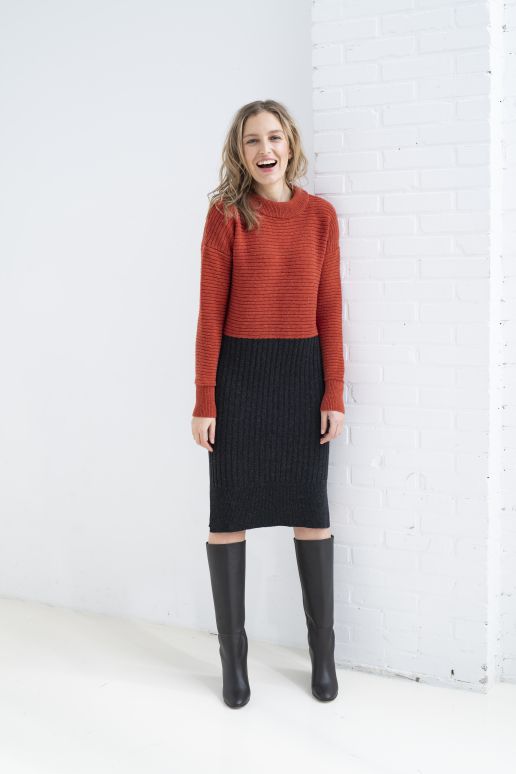
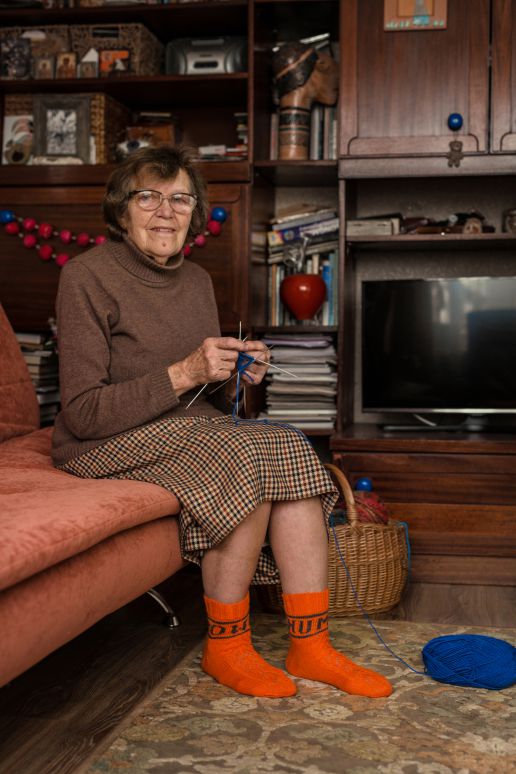
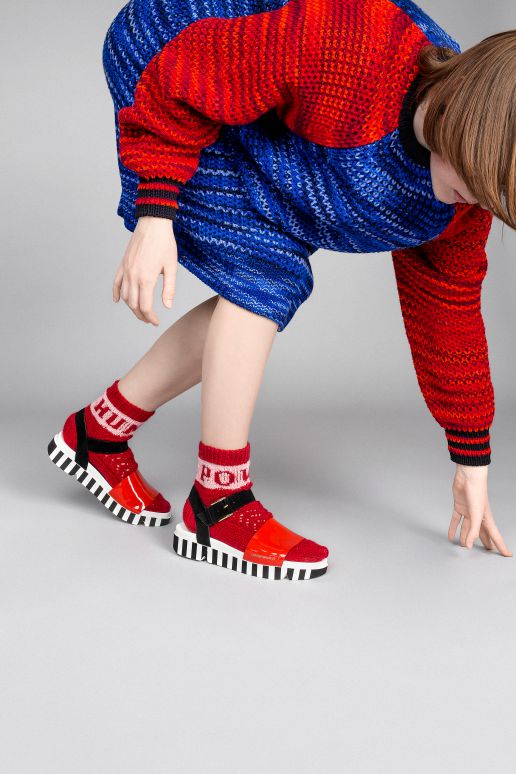
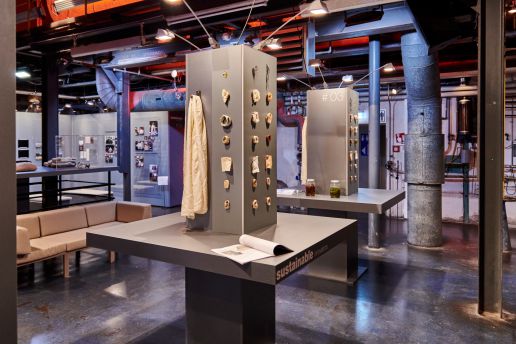
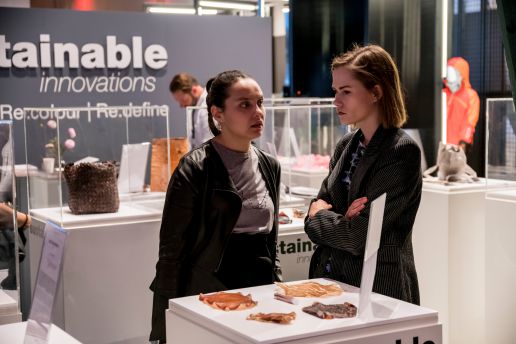
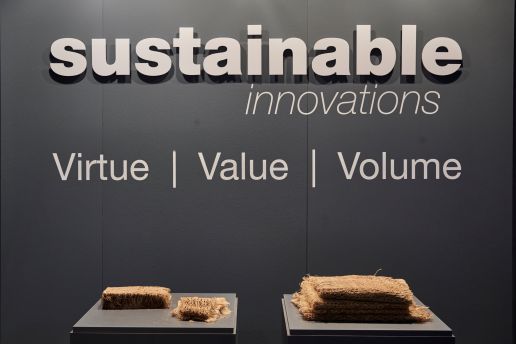
As you can see, sustainability and its related areas are broadly and comprehensively represented. MUNICH FABRIC START became committed at a very early stage and initiated strong forums which are continuously expanding.
You’re invited to attend MUNICH FABRIC START, where more than 1000 suppliers will present more than 1800 collections for Fabrics and Additionals for Autumn.Winter 20/21.
MUNICH FABRIC START: 3-5 of September 2019
Knitcloud by N.I.O. – New Industrial Order: Knitwear Digitalisation
What’s behind the Knitcloud by N.I.O.?
It all started with The Girl and the Machine: an experimental brand around the idea of personalised knitwear. We were looking for an answer to today’s over-consumption that devalues garments and wears out our planet. 3D knitting is a way to produce clothes in one piece, without cutting, without seams and virtually without waste. Now The Girl has evolved into New Industrial Order (N.I.O.). We create digital designs that people can personalise, and produce only when a customer orders it. This way, the customer’s measurements, personal style and fit preferences are incorporated in the production process. It is the ultimate way of making clothes.
What is your vision and mission along the way to disrupt the fashion industry?
The word sustainability in every high-street brands collection does not stop the constant overproduction and too many clothes in our own closets. It is great that there are now lots of people who try to inspire other people to think and change their behaviour. However, being human ourselves, we know how hard it is to change one’s habits. That is why we focus on making the most sustainable, the absolute best and the most fun option imaginable. In the future, we empower people to create their own unique clothes. You decide what is made. Designers and brands will discover a whole new playing field and present amazing, mostly digital garments to communicate their vision. Digitalisation will ultimately make it possible to sell without big investments. Clever networks such as Knitcloud will be key in realizing a liveable balance on earth.
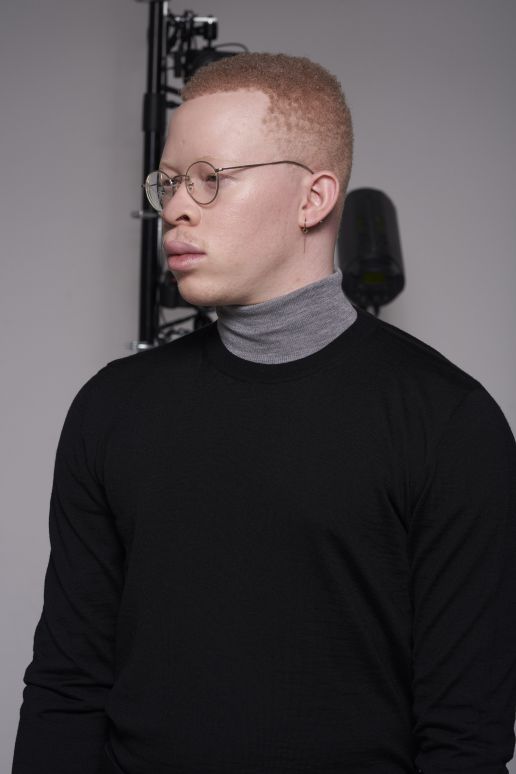
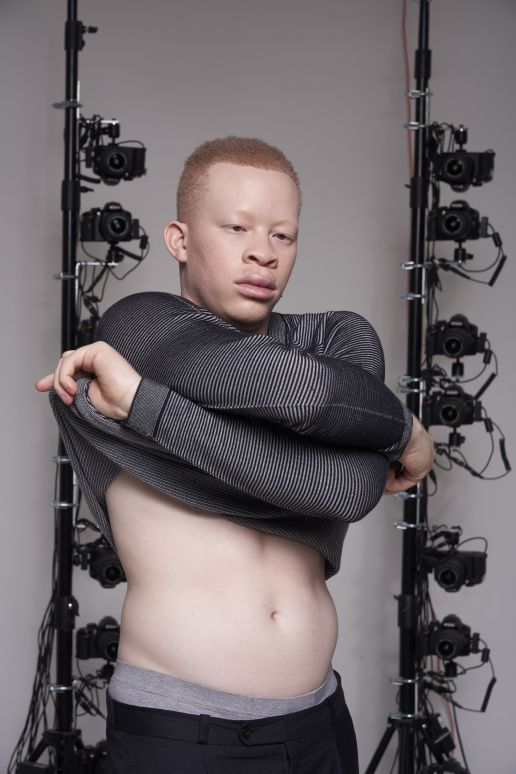
What can our visitors expect from your presentation at Keyhouse?
Knitcloud introduces the industry to the world of Knitting on demand. Creating a global network of knitting machines accessible for everyone. Knitcloud supports brands, designers and webshops by connecting virtual design, body measurement apps and virtual fitting solutions. And the most important we offer a Digital Tailoring System (DTS) and an On-demand Order System (ONOS). Therefore, Knitcloud will be the first open ecosystem for personalised 3D knitwear on demand in the world. At KEYHOUSE, visitors can experience how Knitcloud can be used from the consumers end.
What is more to tell about the product?
During our first experiments, we have made 200 bespoke pieces sold to 200 customers. The experiment was successful what confirmed our vision and made our belief stronger: 3D knitwear on demand is the future.
‘Making this possible on a large scale is a challenge. We are doing this not because it easy, but because it is hard and we are willing to accept this challenge.’
3D-knitwear on-demand requires a radical shift in the supply chain. This is difficult in the current fashion industry, where business models and processes are still focused on mass production. We will also present a showcase of our own new 3D-printed knitwear brand under the name of N.I.O.. Knitted to your size in our standard luxury 100% total-easy-care and extrafine Merino Wool from Baruffa. A jumper that ticks all the boxes of what makes everybody happy: it makes you look great, it is light to wear, soft to the skin, easy to care for. It also stands the test of time and is 100% reusable.
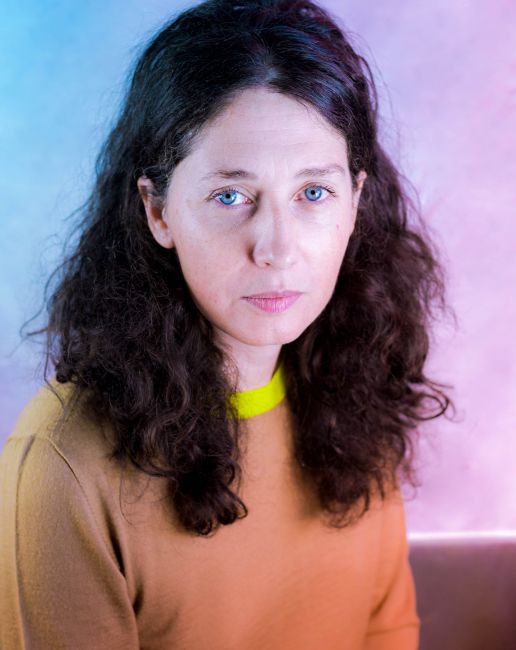
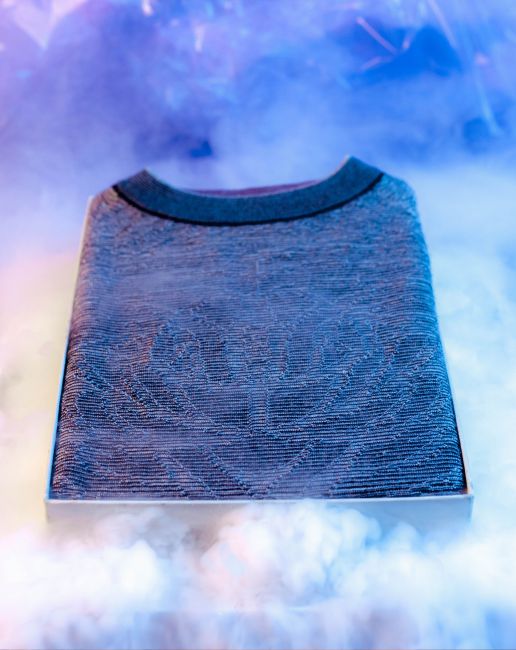
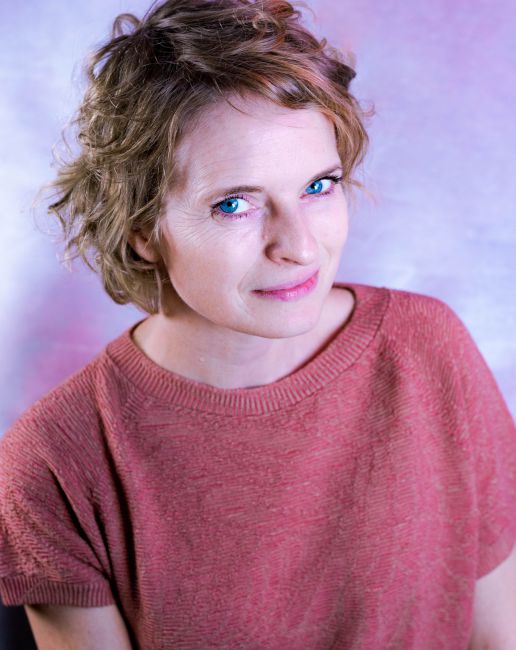
You’re invited to attend MUNICH FABRIC START, where more than 1000 suppliers will present more than 1800 collections for Fabrics and Additionals for Autumn.Winter 20/21.
MUNICH FABRIC START: 3-5 of September 2019
Nat-2™ and Shahar Livne: Sustainable Blood Sneakers
The kind of collaboration which is everything we could hope for here at Munich Fabric Start. Since its inception, Keyhouse is intended to be a platform which promotes the sharing and exchange of knowledge and innovation. We believe that through collaboration, innovations such as those presented by Shahar Livne and Sebastian Thies can thrive; growing arms and legs or in this case Blood Sneakers!
Creating the world’s first sneakers made from REAL BLOOD are nat-2™ Designer Sebastian Thies and Eindhoven based Designer Shahar Livne, both previous exhibitors at Keyhouse 2017 and 2018 respectively. The two designers joined forces in 2018 after meeting each other through Simon Angel who introduced Sebastian to the blood material in a raw state. Fascinated by the material Sebastian then contacted Shahar who was in to the idea. She further developed the material based on the needs for footwear given by nat-2™ and Sebastian designed and constructed the sneaker. Together they also developed the print image which Shahar later printed by silkscreen with real blood pigments. In January 2019 the project was shown to the public for the very first time at Neonyt. Afterwards it went on to exhibitions like Milan and Tortona Design Week, Interzum’s Disruptive Materials and was featured in Dezeen, Sportswear International, Vogue and already many international museums have bought the unique pairs for the collections.
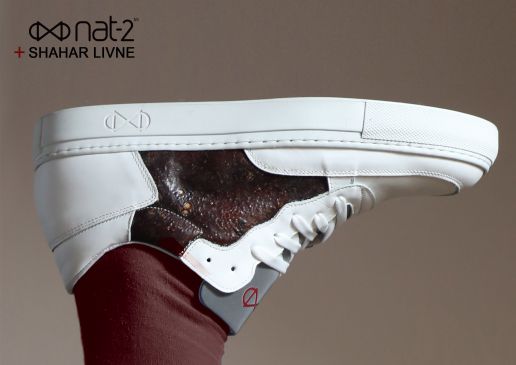
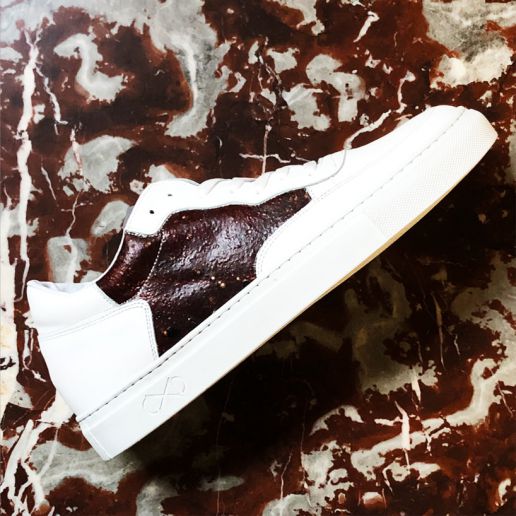
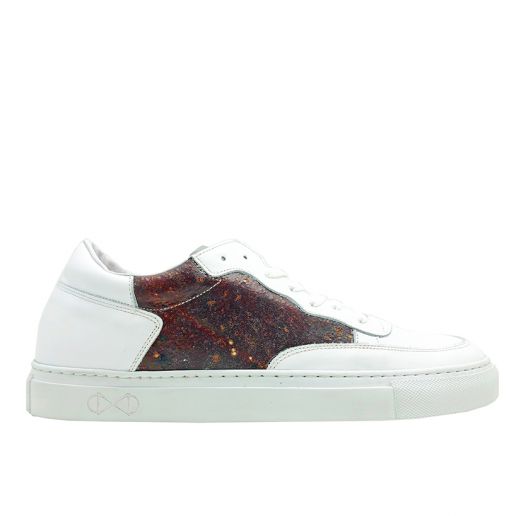
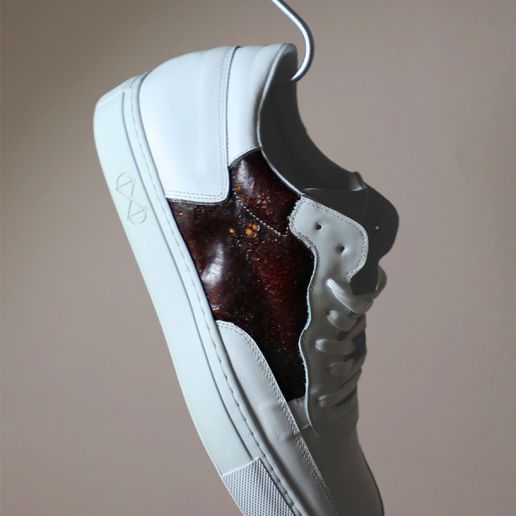
THE PROJECT IDEA
In most slaughterhouses, blood is drained into the sewers and waterways, or re-used as a colourant for meat. Inspired by the construction and de-construction of living subjects in the food industry, Shahar Livne developed a new handmade “bio-leather” by using fat and bones, the subsequent materials from the waste streams of slaughterhouses in the Netherlands, as well as utilizing the wasted blood as a colourant and a plasticizer.
Other materials used in this concept shoe are finest nappa leather, glass, a real cork insole and real rubber outsoles. The shoes are made entirely by hand in Italy and incredibly all according materials are coming from the same region.
“The extraordinary material mix gives the product an absolute new feel and look, never experienced in footwear before”
By realizing these unique sneakers nat-2™ and Shahar Livne want to bring more attention to urgent international matters such as sustainability in different animal-based industries by using naturally occurring resources and upcycling leftovers from those industries. But also making a point for more tolerance, open-minded thinking by raising fascination, curiosity, highlighting the wasteful and disrespectful treatment of animals and natural resources.
Accompanying the sneakers in its 100% recycled paper packaging is a limited edition poster silkscreen printed with a uniquely developed real blood pigment by Shahar Livne, and hand-signed by both designers.



ABOUT THE MATERIAL
The “Meat Factory” project is a series of material experiments with the aim to create dissonance between attractiveness and disgust, natural and industrial attitudes while focusing on the blood as a material and a colourant. The results of the project are visualized in two directions:
1. The use of blood as ink to produce an exciting natural colour range in a silkscreen technique, a repetitive technique that refers to the ancient pigment Oxblood and the industrial revolution relating to food and materials.
2. The Bioleather is made only from meat industry driven waste and low-value materials as a proposal to create new valuable replacements for a polluting and often cruel industry. Shahar investigated the construction and deconstruction of living subjects and the wasteful and cynical treatment of animals and natural resources by human beings, inspired by the philosophy of “Nose to Tail” attitude of using the entire animal.
ABOUT THE DESIGNERS
Shahar Livne (Israeli born, *1989) is an internationally known designer located in Eindhoven, The Netherlands. Her lifelong fascinations in nature, biology, science, and philosophy developed into intuitive material experimentation way of work during her bachelor studies at the Design Academy Eindhoven. Shahar’s body of work focuses on conceptual material research in a multi-leveled methodology, bringing to life narratives through objects and installations centered around materials.
Find Shahar on Instagram
Sebastian Thies (Munich born, *1981), 6th generation footwear designer since 1856 has launched the sustainable luxury brand in 2007. Ever since, the award winning nat-2™ is all about innovation, design and sustainability paving the way for the future fashion footwear by using unique, uncommon materials such as milk, fish leather, natural felt, recycled leather and many vegan luxury alternative materials such as stone, wood, corn, cork, glass, fungus, coffee, grass, flowers, natural rubber and more.
Find nat-2™ on Instagram
Remark: No animal has been harmed or will be in the future by creating these pieces of art. All organic ingredients are from leftover materials. The glue is water-based.
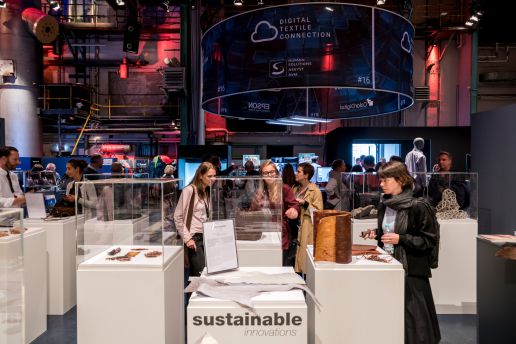
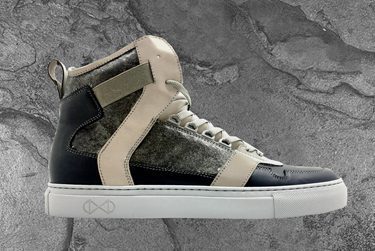
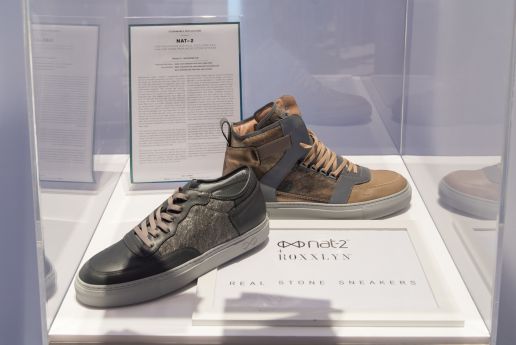
Our thanks and congratulations to Sebastian and Shahar for their successful collaboration and their wonderful insights into a more tolerant and inspiring world.
Planet REhab Capsule: Celebrating Sustainable Collaboration
It is great to have organic fibres, right? But as a producer of fibres, the influence on a more sustainable textile production often stops here. Textile garments have complex supply chains which sometimes imply production partners all over the world. That’s why the solution for a more coherent and holistic form of sustainability often lies in right supply chain partnerships!
That’s the idea behind the so called “Planet Rehab” capsule collection, for which renowned textile companies, who are environmentally committed, have partnered up to create something bigger than their own.
The collection was presented during last edition of KEYHOUSE in January. MUNICH FABRIC START feels especially committed about this project as all project partners – Lenzing, Tejidos Royo, Officina +39, and Tonello have been long term exhibitors at the fair.
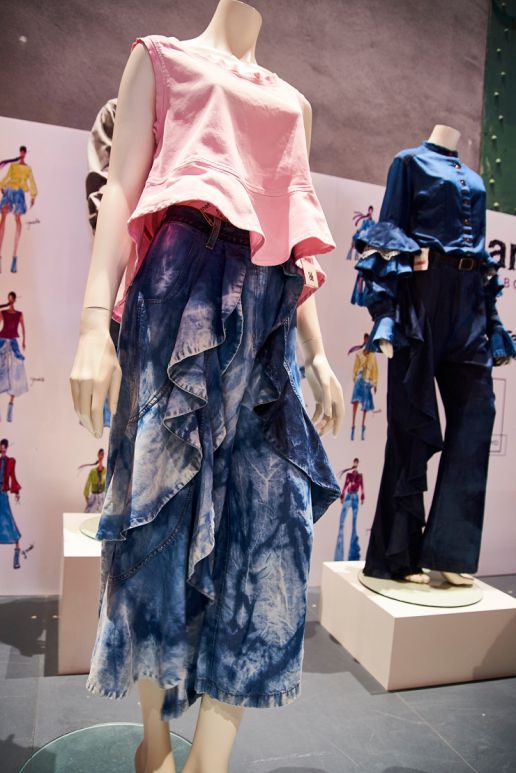
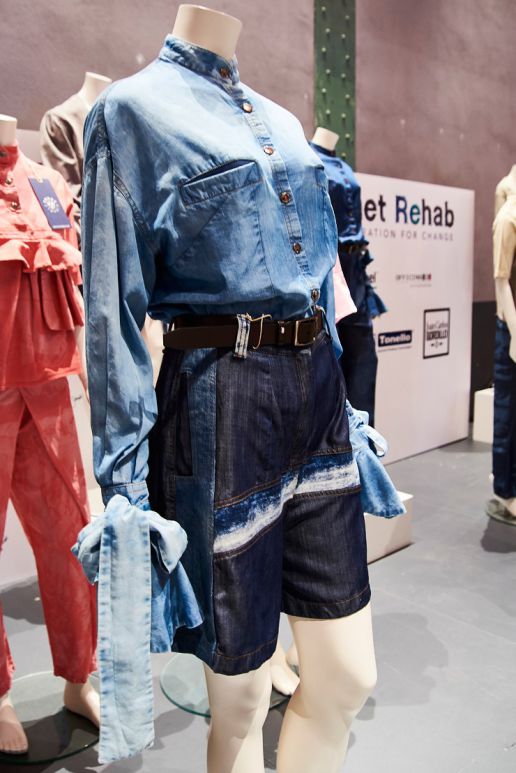
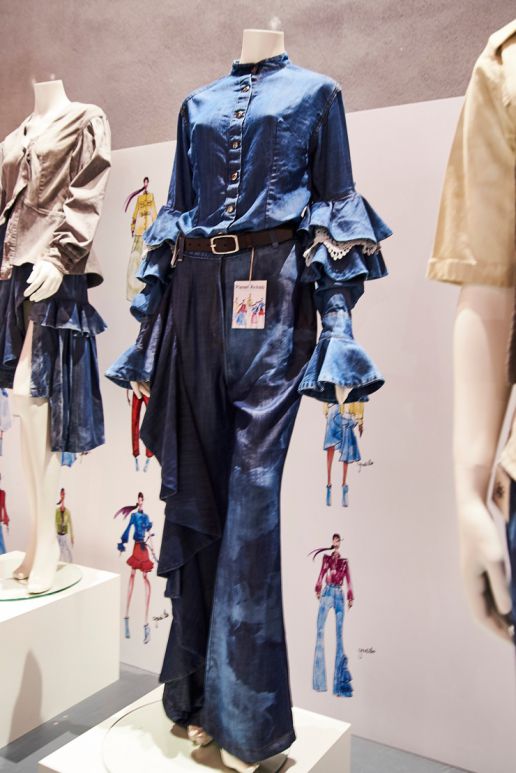
These companies recognized the success to achieving their own goals lies in fulfilling their shared ones, by working collaboratively and responsibly – seeking out more sustainable raw materials, implementing new technologies and employing processes that reduce resource utilization and waste. Juan Carlos Gordillo designed the Rehab collection around Lenzing’s TENCEL™ and TENCEL™ x REFIBRA™ branded lyocell fabrics from Tejidos Royo. The fabrics were dyed using Recycrom technology from Officina+39 and the resultant garments finished by Tonello.
Lenzing’s TENCEL™ and TENCEL™ x REFIBRA™ branded lyocell fibers enhance the sustainable qualities of the fabrics. Made from renewable wood in a closed loop, energy and resource efficient manufacturing process, TENCEL™ fibers and TENCEL™ x REFIBRA™ fibers made with recycled cotton scraps provide the fabrics with softness, smoothness, tenacity, and color intensity.
Spanish fabric producer, Tejidos Royo, creates “fabric with values” through the company’s commitment to the United Nations Sustainable Development Goals. The manufacturer’s vertical business model has substantially reduced its energy consumption and CO2 emissions through aggressive R&D and provides complete transparency and traceability for their customers
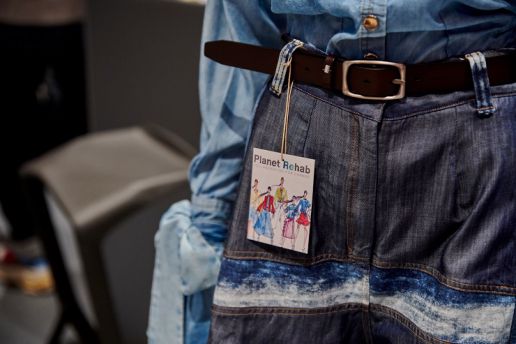
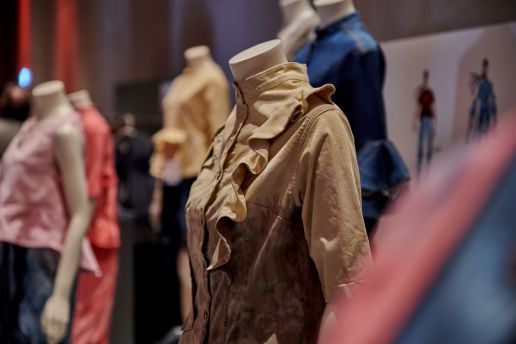
Officina+39’s Recycrom dyes are made from recycled clothing and textile scraps that are specially processed by these Italian experts through a sophisticated production process using only natural chemicals. Waste fabrics are crystalized into an incredibly fine powder that can be used as a pigment dye. Recycrom received the Hightex Award at MUNICH FABRIC START for Autumn/Winter 17/18.
Laundry specialist Tonello also based in Italy, contributed their ECOFREE 2 technology to the project. Fulfilling the needs of the designers and their customers, Tonello’s revolutionary washing process significantly reduces the water and hazardous chemical consumption typically associated with denim finishing.
Guatemalan designer, Juan Carlos Gordillo, applauds the Planet REhab objectives and used the member companies’ products to create fifteen women’s outfits that celebrate life and nature with exceptional color flair and a decidedly Latin influence. The full collection was displayed during the last edition of KEYHOUSE in January 2019, showcasing the eclectic and artistic style for which Gordillo is known for.
“Planet REhab is my tribute to the ocean with its deep colors and flowing shapes,” the celebrated designer says. “The collection also protects the ocean because it is created from the sustainable fibers, fabrics, dyes, and finishing techniques perfected by the Planet REhab collaborating companies. While many companies talk about being sustainable, these companies had the courage to actually create sustainable products and processes that benefit the industry, society, and the planet. I hope this collection can inspire other designers to prioritize sustainability in their creative processes.”
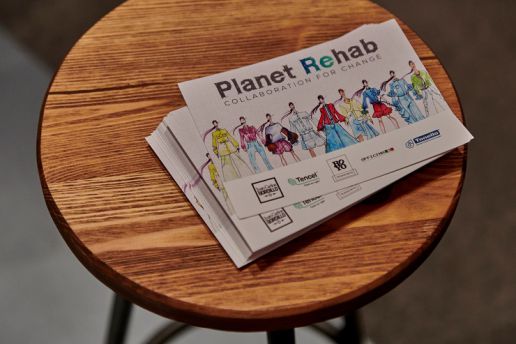
Sustainability as an Innovation Driver – these were the most important issues at KEYHOUSE
Besides the all-encompassing theme of sustainability, technology and digitalisation were the predominant subjects for discussion at the KEYHOUSE, the Innovation Think Tank of MUNICH FABRIC START. There was a great need to talk, both at the stands and in the discussions and round tables with high-calibre panelists at the KEYHOUSE FORUMS.
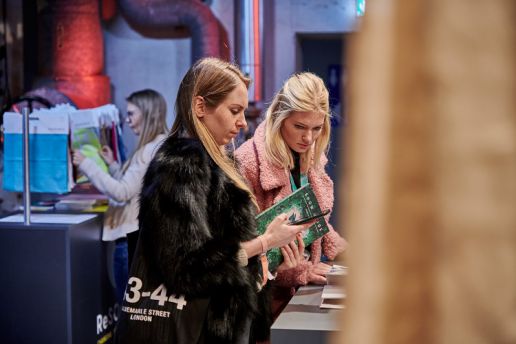
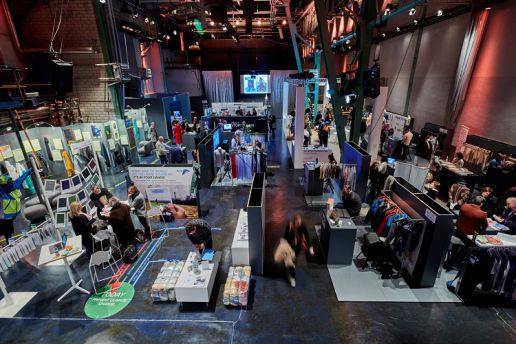
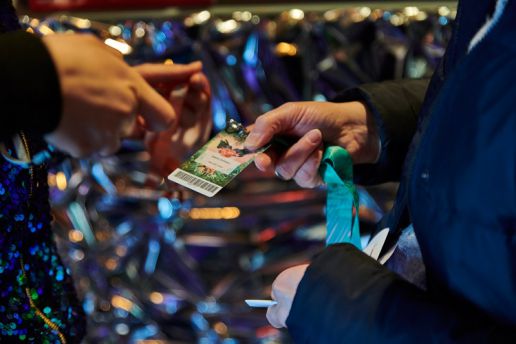
The keynote speech on “The Circular Economy Journey of Sustainable Luxury Pioneers” of Kresse Wesling, Co-Founder und Director of Elvis & Kresse made it clear that sustainability has long become more than a niche topic for environmentalists. She showed that today’s luxury sector sees an increasing demand for sustainable fashion and accessories. On a cross sectoral level David Shah, owner of VIEW talked about “Why Performance, Comfort and Sportswear Fashion will dominate Apparel for the Foreseeable Future”.
Another highlight certainly was the contribution of Li Edelkoort – one of today’s most important trend forecasters. The visionary presented trend directions for Spring.Summer 2020 and unpublished content for the Colour Forecast for Autumn.Winter 2020/21 in an exclusive seminar.
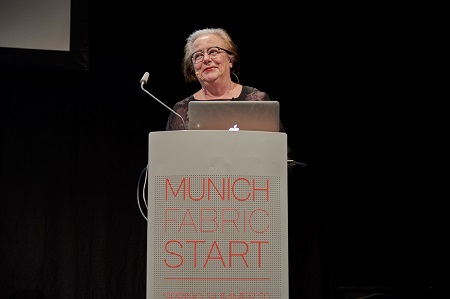
With the help of digitalisation but also with innovative supply chain partners more sustainable results can be achieved in the long run. This has been proven by the Planet REhab collaboration of designer Juan Carlos Gordillo who created a collection made of TENCEL™ und TENCEL™ x REFIBRA™ fibres from Tejidos Royo. The fabrics were dyed with Recycrom-technology by Officina+39 und then equipped with a finish by Tonello. The result, which could be inspected at KEYHOUSE, demonstrated impressively how the sustainability aspect itself acts as an innovation driver. A further example was given by Swedish company We aRe SpinDye® who have revolutionized the dyeing process of polyester for the textile industry. They were the first to succeed in developing a fully certified dyeing process including all production stages, which sets new standards with respect to clean colours and environmental engagement.
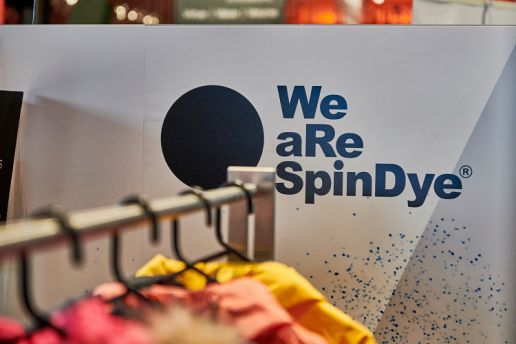
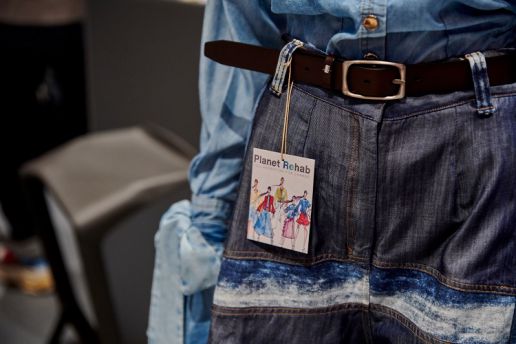
Beyond this, the exhibition format SUSTAINABLE INNOVATIONS at KEYHOUSE showcased the visionary spectrum of the latest material innovations and future orientated sourcing concepts. Here the innovation aspect is on sustainability in particular. For the current season, Diane Scherer presented her project Interwoven, in which the root structure of plants is being transformed into fabrics.
Another example of botany is given by Dutch designer Nienke Hoogvliets. She demonstrated, how algae blooms can be utilized to attain textile colours and environmentally friendly yarns.
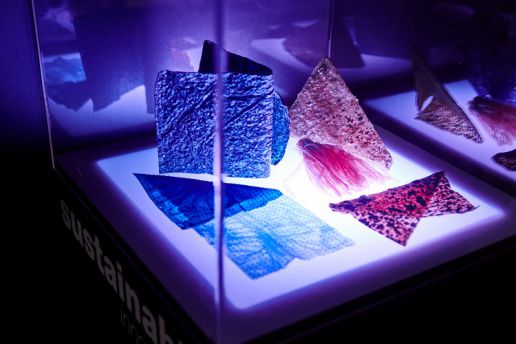
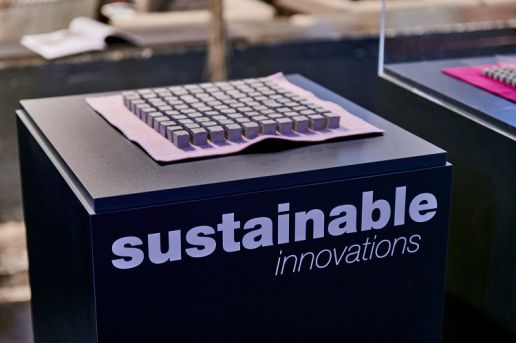
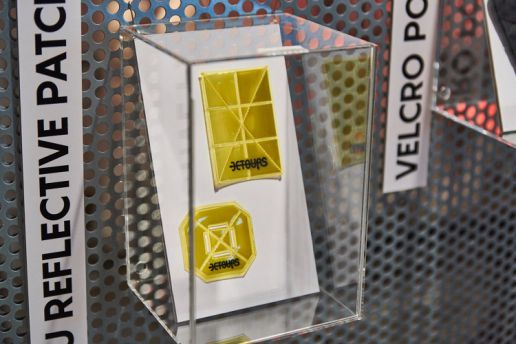
Another focal theme at KEYHOUSE was the presentation of the Hightex Award. The winner of this year’s innovation award was Becker Tuche, Aachen. The company received the award for a new product development combining wool and Cordura with spandex – super lightweight and highly functional. The runner up was Soorty Enterprises with an extremely lightweight, recycled and water-repellent denim in a Tencel/nylon blend and in third place came Mectex by Manifatture Italiane Scudieri. The Italians are known for their high-tech developments in the sports and outerwear segment and come up with new ways and solutions for fusing comfort and function.
